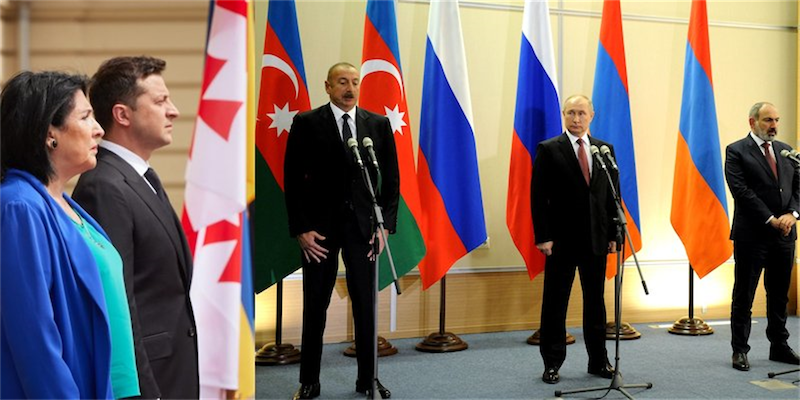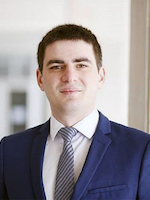
- This event has passed.
The Economic, Political, and Security Consequences of the War in Ukraine for the South Caucasus
October 24, 2022 @ 12:00 pm – 1:30 pm

The Fletcher School of Law and Diplomacy at Tufts University and Sokhumi State University welcome you to a virtual panel discussion about the political, economic, and security repercussions of the Russia-Ukraine war for the South Caucasus. The panelists will discuss how the war has affected Georgia, Azerbaijan, Armenia, and the regional territorial conflicts in Abkhazia, South Ossetia, and Nagorno-Karabakh. The event is open to the public. Please make sure to register via myFletcher to participate in the event on Zoom.
Speakers:
 | Vakhtang Charaia is a professor, economist and the Dean of Business and Management School at Grigol Robakidze University. In 2018 and 2019, the Ministry of Education, Science and Culture of Georgia named him the Best Young Scientist of Georgia. He is the vice president of the Georgian Small and Medium Enterprises Association. He has served as an expert in economics in International organizations such as Alert (UK); country expert at V-dem (Sweden); and was an affiliated lecturer of Harvard Business School’s Institute for Strategy and Competitiveness for two years. Professor Charaia received his Ph.D. from Tbilisi State University. He has authored and published more than 40 scientific articles. He has participates at different international conferences and forums in more than 50 different countries. He has won numerous scholarships from the Georgian government, as well as international organizations, including IMF, DAAD, HESP, and EC. |
 | Malkhaz Kakabadze was Ambassador Extraordinary and Plenipotentiary of Georgia to the Kingdom of Sweden and the Republic of Finland between 2016 and 2021. He was also head of the Permanent Mission of Georgia in the UN. He served as an ambassador to the Russian Federation between 1998-2000. During his time in the Georgian Foreign Service, Mr. Kakabadze successfully initiated and negotiated European Union-supported post-conflict rehabilitation projects in Tskhinvali region of Georgia. Mr. Kakabadze received his Ph.D. from Tbilisi State University in Economic and Social Geography. His PhD thesis focused on “Foreign Trade of Iraq between 1968-1997.” Currently, he serves as a senior fellow in SSU in the Department of Regional Security and Conflict Resolution. |
 | Petre Mamradze is a politician and a former member of the Georgian Parliament. He holds a doctorate in theoretical Physics and Mathematical Sciences. Mr. Mamradze’s thesis was on "Fundamental processes of annihilation in high magnetic fields." He is a recipient of prestigious Knight of the Order of Merit (2006). In 1992, he was an assistant to the Vice Prime Minister. In 1992-1995, he was a member "Green Party of Georgia." In 1995-2003, he was the First Deputy Minister of State and Head of the State Chancellery. In 2003-2008, he was the head of the Chancellery of the Government of Georgia, from 2008-2012, he was a Member of the Parliament of the 7th convocation of Georgia with the party list "United National Movement - Winner for Georgia." He has authored and co-authored many articles and books on subjects ranging from Georgian politics and geopolitics to works on sciences. |
 | Maia Otarashvili is a Research Fellow and Deputy Director of the Eurasia Program at the Foreign Policy Research Institute (FPRI). Maia also serves as the Deputy Director of Research at FPRI. She is co-editor of FPRI’s 2017 volume Does Democracy Matter? The United States and Global Democracy Support. Her research interests include geopolitics and security of the Black Sea-Caucasus region, Russian foreign policy, and the post-Soviet “frozen” conflicts of Abkhazia, South Ossetia, and Transnistria. Maia is a Ph.D. candidate at the War Studies Department at King’s College, London. She holds an M.A. in Globalization, Development, and Transition from the University of Westminster in London, with emphasis on post-authoritarian transitions. |
 | Jeffrey Taliaferro is Professor of Political Science at Tufts University, where he has taught since 1997. His research and teaching focus on security studies, international relations theory, international history and politics, the grand strategies of the great powers, U.S. foreign policy, intelligence, and cybersecurity. His most recent book is Defending Frenemies: Alliance Politics and Nonproliferation in U.S. Foreign Policy (2019). He is also the author of Balancing Risks: Great Power Intervention in the Periphery (2004). Taliaferro previously held a research fellowship at the Norwegian Nobel Institute in Oslo, Norway in 2016 and a fellowship at the Woodrow Wilson International Center for Scholars in Washington, D.C. in 2017-2018. He earned a bachelor's degree in history and political science from Duke University and a Ph.D. in government from Harvard University. |
